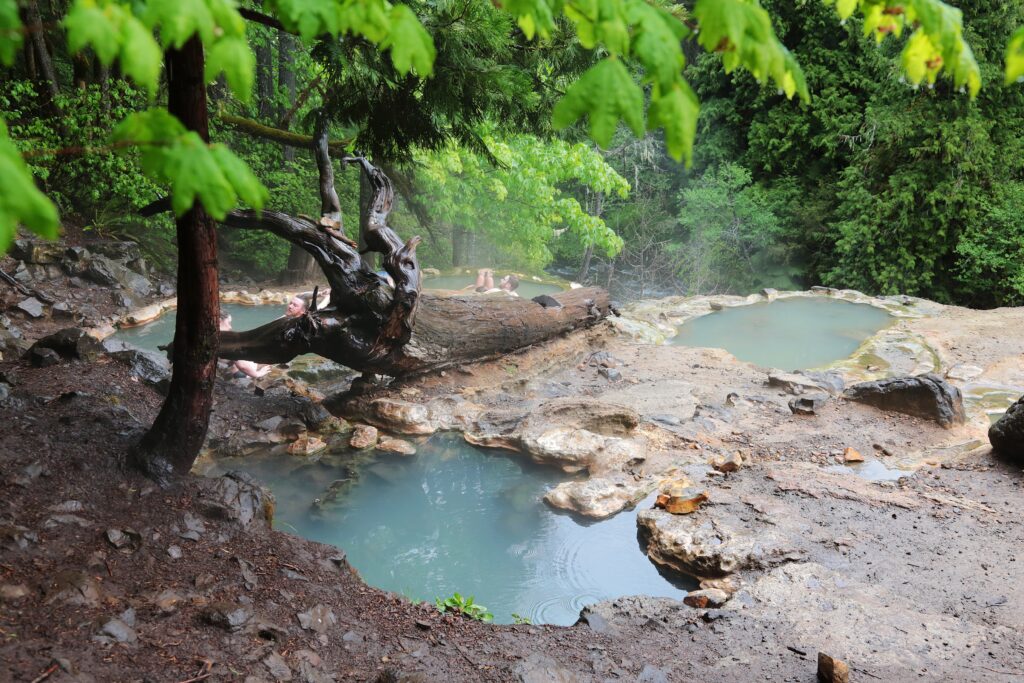Early on a recent spring morning, half a dozen people lounged around Umpqua Hot Springs’ turquoise pools, chatting quietly as a faint mist held onto the treetops in the dense evergreen forest.
The idyllic scene is the reason so many travel to this remote part of Oregon’s Cascade Mountains, but with that popularity has come a host of disturbing challenges that the hot springs destination has struggled to shake — despite efforts by the U.S. Forest Service, which manages the area.
In 2016, the Umpqua National Forest
issued new rules for Umpqua Hot Springs
, banning overnight camping and implementing a new $5 day-use fee after documenting a litany of issues, including the discovery of more than 100 piles of human feces around the area, detection of dangerously high levels of bacteria in the pools (resulting in repeated closures), destruction of the forest itself, and frequent cases of illegal drug use and littering.
Calling the issues “unacceptable,” forest officials at the time said they wanted to get the site “back to what the public expects when they go out to a forest.”
Nearly a decade later, the results of those efforts are mixed.
Overnight camping is banned at Umpqua Hot Springs after years of abuse, according to the Umpqua National Forest.
Jamie Hale/The Oregonian
Tiered pools are stacked above the North Umpqua River.
Jamie Hale/The Oregonian
Two faces
There are two very different faces to Umpqua Hot Springs, revealed through its typically erratic, but often helpful online reviews. Intermixed with the glowing five-star reviews hailing the place for its serenity and beauty are scathing one-star takedowns lobbing serious criticisms at the management of the landscape or, more frequently, some of the other people who visit.
“It’s a beautiful place if you go early and avoid all the people,” one Google reviewer wrote last year. “Some people like to think that the forest belongs to them and giving one rules on what to do and who can go in the water.”
“I would say this is a one and done visit,” a soaker wrote on Tripadvisor. “View of the Umpqua River is magnificent; sadly this is the only redeeming factor for Umpqua Hot Springs.”
“This area has obviously been loved to death, as well as used and abused,” another visitor wrote on AllTrails. “I hope one of these days a reservation system is put in place; it would help the area to recover from the masses as well as allow proper relaxation.”
Crowds are by far the biggest complaint in online reviews, even among those who leave positive comments. People also complain about trash, dirty water, drug use and negative interactions with other soakers. Nudity, which is allowed at the hot springs, also seems to make some visitors uncomfortable.
While these complaints have remained constant before and after the 2016 rule changes, these days, those voices seem to be in the minority. Most online reviewers in the last two years have reported leaving with a positive impression of the hot springs.
“Absolutely beautiful as always,” one recent visitor wrote.
“So serene and beautiful!” wrote another.
“This place is magic, the vibe is how you choose to perceive it,” one Google reviewer mused. “The water leaves you feeling refreshed it’s truly a healing place, that brings all kinds of people together, a melting pot.”
The problem is that not everybody plays nice.
Pools range from pure turquoise to milky and gray, depending on water quality.
Jamie Hale/The Oregonian
A rainbow colored bridge leads over the North Umpqua River on the way to Umpqua Hot Springs.
Jamie Hale/The Oregonian
Break-ins, hard drugs and trash
Every year, the Douglas County Sheriff’s Office responds to dozens of calls at Umpqua Hot Springs.
Undersheriff Brad O’Dell said those include reports of theft in the parking lot and possession of hard drugs, though deputies also have found extensive littering and graffiti at the hot springs as well.
“Most of the criminal activity seems to occur after hours while daytime hours see less criminal activity,” he said in an email.
The number of calls tends to ebb and flow. In 2022, the sheriff’s office received 36 calls for service at Umpqua Hot Springs, O’Dell said. In 2023, the number rose to 71. In 2024, it fell back to 43. The department has received 13 calls so far in 2025, as of the end of May.
O’Dell noted that the numbers could be higher; this data only covers calls where the specific location was tagged. Any number of incidents could go unreported to police.
There are also some people who try to violate the U.S. Forest Service’s camping ban. Such a violation
could technically result
in fines of up to $5,000 and prison sentences of up to six months.
The U.S. Forest Service did not offer any incident data of its own and said it does not keep track of responses from other agencies at Umpqua Hot Springs. A regional spokesperson for the forest service, who answered questions via email in an official capacity but refused to be named, said the federal agency has collaborated with other agencies for “increased law enforcement” in the area around the hot springs “to protect the resource and the public,” but declined to elaborate further.
One major issue that forest officials have seen involves the recreation area’s seasonal closure, the spokesperson said. The road leading to the hot springs closes every winter from November through April as significant snowfall results in dangerous conditions for drivers, but people often vandalize the gate, sowing chaos in the remote area.
“This vandalism leads people unfamiliar with the area to believe the road is open and maintained for highway vehicle traffic year-round, which results in numerous vehicles getting stuck on the unmaintained, snow-covered road,” the spokesperson said. “This has created dangerous situations for unprepared motorists and puts a strain on emergency services.”
Every year, search and rescue crews conduct a few missions around Umpqua Hot Springs, according to data from the Douglas County Sheriff’s Office. In 2023 the office conducted seven missions, and in 2024 it did four. Officers have already conducted three search and rescue missions so far this year.
Those missions have included
rescuing stranded drivers in the snow, and saving people who become lost in the forest or injured on the trail.
Those visiting the hot springs must take a short, but precarious walk to get there. The quarter-mile hike crosses the North Umpqua River on a rainbow-colored footbridge, then heads into the forest and climbs up a steep hill covered with a snaking network of exposed roots. A wooden handrail is built into the side of the hill, though some planks are missing and some sections are unstable (it is also heavily graffitied). At the top of the hill, the trail becomes lost in a maze of user-made paths, though all paths eventually converge and lead to the pools.
The U.S. Forest Service declined to comment about the current state of the trail, noting only that the Umpqua National Forest “continually works to make improvements to all recreation sites” and warning visitors to “always evaluate trail characteristics and assess their own fitness, experience, and comfort levels.”
The trail to Umpqua Hot Springs leads up a steep, root-covered hill.
Jamie Hale/The Oregonian
A guardrail offers hikers some sense of safety, though it is shaky in places and missing planks in others.
Jamie Hale/The Oregonian
Business as usual
While there are still issues at Umpqua Hot Springs, some things seem to have improved since the new rules went into effect.
The U.S. Forest Service said it has seen a reduction in trash, human waste and even overall visitor numbers at the site since 2016. The agency spokesperson said the new regulations have been successful enough that the Umpqua National Forest Service has acted to keep them around, re-signing them most recently in April 2024. The rules are expected to remain in effect until 2026, when they could be extended again.
Rule changes are just one strategy to rein in unruly behavior at a natural hot springs. At other Oregon spots, the U.S. Forest Service has instead chosen to hire a private company to run the sites.
In 2005, the Willamette National Forest turned over management of Terwilliger Hot Springs
to a private company
as it raised the day-use fee to $5 per person; since then, the fee has been increased to $12 per person. Privatization was an attempt to curb drug dealing, prostitution, sexual assault and other issues at the Willamette National Forest site, forest officials said at the time. The hot springs was also the site of a 1996 killing, following a clash between campers.
The Mt. Hood National Forest came to the same decision in 2012, when it
hired a company
to manage Bagby Hot Springs after years of complaints about drug and alcohol use, off-leash dogs, car break-ins and assaults. The incoming company quashed all free-wheeling behavior — including nudity.
However, the U.S. Forest Service said
it has no plans to take the same approach at Umpqua Hot Springs.
“The Forest has looked into a concessionaire for the Umpqua Hot Springs in the past and have found that is not a viable option,” the forest service spokesperson said. They declined to elaborate further.
Two of Oregon’s other Cascade Mountain soaking spots, McCredie and Bigelow hot springs, are still managed by the U.S. Forest Service and require only a proper parking pass to visit. Both sites are considerably smaller than Umpqua Hot Springs.
That means, for the time being, it will be business as usual at Umpqua Hot Springs. Visitors to the mountain springs can expect a little bit of everything they read in the reviews: nice views, warm water, and maybe a challenge or two along the way.
If you go: Umpqua Hot Springs is open to the public from dawn to dusk. The road to the springs is open from May to November. A $5 day-use fee is required. The best way to pay is using the Recreation.gov app, which should be downloaded before you leave, and which can be used to scan a QR code onsite.





More Stories
Federal officials changed rules to protect Umpqua Hot Springs. A decade later, results are mixed
Federal officials changed rules to protect Umpqua Hot Springs. A decade later, results are mixed
Federal officials changed rules to protect Umpqua Hot Springs. A decade later, results are mixed